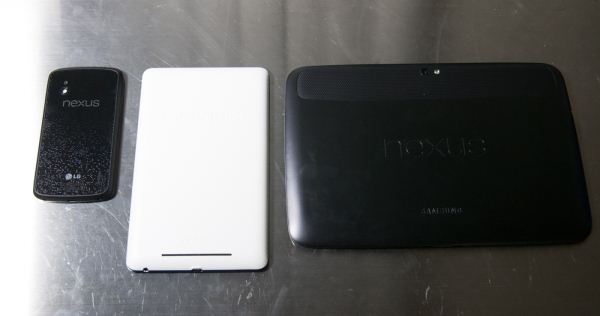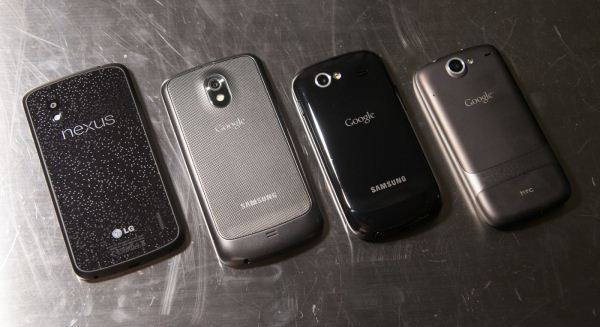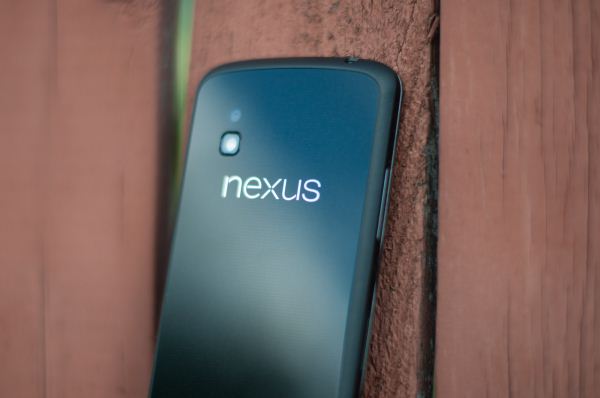Google Nexus 4 Review - Google's new Flagship
by Brian Klug on November 13, 2012 8:45 AM EST- Posted in
- Smartphones
- LG
- Android
- Mobile
- APQ8064
- Nexus 4
- Android 4.2
- MDM9215
With the Nexus 4 conclusion I really have to finish the way I started, namely by noting that this is now the fullest realization of Google's original strategy laid out for Nexus at its inception. The Nexus One had extremely aspirational goals for a first-gen Googlephone — it tried to change the way that phones are sold in the US and tried to deliver a fully carrier-agnostic reference platform for developers and OEMs to build out from. The end of that story is something everyone is familiar with, however — the Nexus One was largely a commercial failure. Little did we all know it would take several more iterations of the Nexus hardware and Android platform to get close to delivering on those goals, and Google has inched closer each time.
The next revisions of Nexus built on this platform, but only with Galaxy Nexus and its pentaband WCDMA radio and Nexus 4 do we see the fullest realization of this dream. Over time Google has built up the infrastructure required to deliver on its goals with things like the Play Store, a reputation among hardware vendors, and the right combination of hardware and software cadence to make this all work. The price point with the Nexus 4 is now low enough to not make off-contract sale an impossible to swallow deal.
With the Nexus 7 I felt like we were truly seeing the Nexus line come into its own. With Nexus 4 and 10 we're now seeing Google finally deliver a product lineup with offerings in each of the major size tiers. We now have a form factor of device for every two inches of diagonal difference.
With the Optimus G, LG truly went all the way toward delivering the best of everything it had to offer from all the different parts of LG — LG Chem, LG Innotek, LG Display. I'm very positive about the Optimus G hardware and very positive about the Nexus 4 as its close relative. LG's execution in the smartphone space has primarily been held back by its software approach and skins, and until recently a lack of updates. Getting a win for LG in the Nexus space basically mitigates that, as the software burden becomes entirely Google's, and obviously Nexus will continue to mean the latest and greatest Android platform updates for quite some time.
You can go back and read what I've written about the Nexus 4 hardware — in a word it's superb. In-hand feel is awesome thanks to the rubber ring running around the perimeter of the Nexus 4, and build quality is also very good. I've fully disassembled my Nexus 4 three times and put it together without issue, and the Nexus 4 has taken a few trips to the floor (my fault) without any adverse effects.
Finally, there's also the matter of price. For $299 you can get the latest and greatest hardware and 8 GB of storage, and for $349 you can get double that storage with 16 GB (12.92 GB usable). Both are fully unlocked and carrier-agnostic, and at those prices the Nexus 4 pretty much blows the doors off of any other unlocked or out of contract smartphones, which usually end up being priced at around $600 or more.
If you're an Android enthusiast, the Nexus 4 is obviously the phone to have right now. The combination of APQ8064 and MDM9x15 is excellent in spite of some unfortunate thermal throttling, and we'll be seeing many more Fusion 3 based devices in time at prices well above the Nexus 4 out of contract. At a fundamental level there is quite literally no better vehicle out there for Google to communicate its smartphone platform via than the yearly Nexus refresh. On its own, the Nexus 4 would otherwise be phenomenally great hardware. As a Nexus, it's a level even beyond that.
Google has come an exceptionally long way since that first Nexus One.













188 Comments
View All Comments
meloz - Wednesday, November 14, 2012 - link
>It's really cheap, though.Until you include the price of a carrier plan? Or were you planning to use this smartphone without any phone capabilities? Apple iphone sells so well *inspite* of its premium price because most people who buy it buy with plans.
doobydoo - Thursday, November 15, 2012 - link
The iPhone 5 is $199 on contract, right?How much is the Nexus 4 on contract?
Guspaz - Thursday, November 15, 2012 - link
Hard to do a direct comparison when you can't find the thing anywhere. None of the major Canadian carriers have the Nexus 4, but the LG Optimus G was $50 less than the iPhone 5. A list of what I saw:iPhone 5: $180
LG Optimus G: $130
Galaxy Nexus: $0
iPhone 4S: $0
Sabresiberian - Tuesday, November 13, 2012 - link
This is the best thing Google does (make phones that can be used on any service provider), in my opinion. $300 (or $350) for a top-end phone you can use on any carrier? Almost makes my desire for a Nokia 920 Win 8 phone go away.Then, I think about Android compared to Win 8, and realize that will likely never happen.
;)
crankerchick - Tuesday, November 13, 2012 - link
Thanks for the thorough review. Too bad this phone will go largely unnoticed in the US amongst non-enthusiasts, and almost wholly ignored by any one on CDMA. Those of wanting LTE (who also acknowledge that a nexus on VZW is a hard feat to accomplish) are left wanting more, and *gasp* looking at the iPhone 5. I wanted this to be my next, but I'm not willing to switch to have it.I hope the folks around the world make this phone super-successful and can make this phone a game changer in the Android landscape (and here in the US where carriers rule and the customers drool). That's a lot to ask, but I'm still hopeful.
superjim - Tuesday, November 13, 2012 - link
WTB Nexus 10 review. Sure there's plenty on the net but I specifically wait for the AT review.Pipperox - Tuesday, November 13, 2012 - link
I do not understand how Google can sell a "flagship" phone which is unable to complete a 3D benchmark without thermal throttling.This is unacceptable, do they expect people who run intensive 3D apps such as games to take a liquid cooling kit with them?
Also unacceptable is the lack of browser optimizations for this SoC.
The Snapdragon S4 Pro is a BEAST, with 2x the theoretical CPU power than pretty much any other ARM SoC (with the exception of the Cortex A15 which is only for tablets now), and yet one sees lackluster performance in most browser related tests.
This is a diamond which hasn't been polished at all... the only thing going for it is the price.
JohnnyL53 - Wednesday, November 14, 2012 - link
The throttling is not an issue if it doesn't result in any real world performance slowdown. Although the reviewer adds subjective comments to the battery life section, I would like to see some comments as to how benchmark performance actually relates to real world performance. What seems to be poor performance in a benchmark may not even be apparent when playing a 3D intensive game.meloz - Wednesday, November 14, 2012 - link
>The throttling is not an issue if it doesn't result in any real world performance slowdown.Yes, because in real world everyone will use this device in temperature controlled room (mom's basement?). I mean, who goes out on a hot summer day?
doobydoo - Thursday, November 15, 2012 - link
The bottom line is that if you have to use a freezer to get results from a phone in the same situation where other phones don't have such a requirement, there are issues.The reality is that this phone probably gets too hot so the throttling was a necessity rather than a choice.